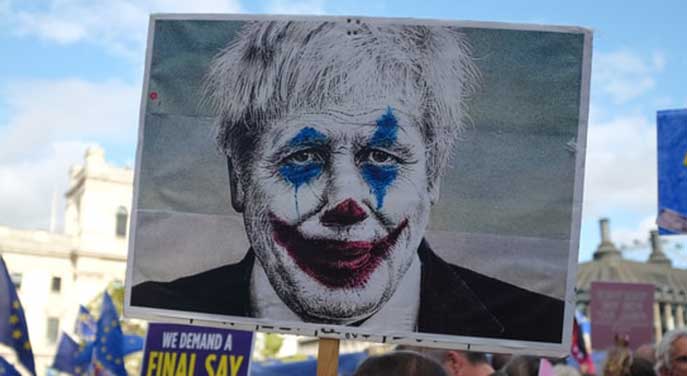 When U.K. Prime Minister Boris Johnson reflects on his political career, there will always be a certain fondness for the Dec. 12, 2019, general election.
When U.K. Prime Minister Boris Johnson reflects on his political career, there will always be a certain fondness for the Dec. 12, 2019, general election.
His Conservative government earned a majority of 80 seats, the party’s largest since 1987. The party also had a net gain of 48 seats and its highest percentage of the popular vote (43.6 percent) since 1979, when Margaret Thatcher resided at 10 Downing Street.
Johnson, who officially became prime minister on Jul. 24, 2019, after a Conservative caucus vote, was firmly in the catbird’s seat. His political vision to reform and revitalize the United Kingdom seemed impenetrable.
Fast forward to Jul. 7, 2022. In just over two days, the embattled PM lost the confidence of 63 179 ministers, parliamentary private secretaries and trade envoys. He announced his resignation as party leader, although he said he would remain prime minister in a caretaker capacity until his successor is chosen in October.
“In the last few days,” Johnson said in his resignation speech, “I’ve tried to persuade my colleagues that it would be eccentric to change governments when we’re delivering so much and when we have such a vast mandate and when we’re actually only a handful of points behind in the polls, even in midterm after quite a few months of pretty relentless sledging and when the economic scene is so difficult domestically and internationally.”
 |
| RELATED CONTENT |
| Is it curtains for Boris Johnson? By Pat Murphy |
| No, Boris Johnson isn’t another Donald Trump By Michael Taube |
| Trudeau government dodges democratic accountability By Jason Clemens and Jake Fuss |
He was unsuccessful in those attempts, “but as we’ve seen at Westminster, the herd instinct is powerful and when the herd moves, it moves.”
He also cavalierly told the British public: “I want you to know how sad I am to be giving up the best job in the world. But them’s the breaks.”
How did everything that looked so promising collapse in a huge political heap?
Political and economic struggles related to COVID-19 kicked things off. Questions surrounding refurbishments to the chancellor of the exchequer’s private residence at 11 Downing Street, which ultimately led to a £17,800 fine, didn’t help. The fuel supply crisis in 2021 was a political snafu, too.
Yet the true starting point of Johnson’s demise was Partygate.
According to ITV News’s U.K. editor, Paul Brand, on Jan. 25, the PM had a “birthday party during the first lockdown in 2020 despite the rules forbidding social gatherings indoors at the time. It’s alleged that the prime minister’s wife, Carrie Johnson, helped organize a surprise get-together for him on the afternoon of Jun. 19 just after 2 p.m.” A total of 30 people “are said to have attended the event in the Cabinet Room,” Brand wrote, “after Boris Johnson returned from an official visit to a school in Hertfordshire.”
The Metropolitan Police investigated Johnson due to this public health breach. On Apr. 12, he received a fixed penalty notice of £50 for breaching COVID-19 regulations that his government set in place. The amount was as light as a feather. Nevertheless, as the BBC’s Jennifer Scott wrote on Apr. 13, “Johnson became the U.K.’s first serving prime minister to be sanctioned for breaking the law.”
Partygate led to a collapse in Johnson’s popularity and a disastrous showing for the Tories in the May 5 local elections. The PM faced a vote of no-confidence in early June but exceeded the threshold with 59 percent support (or 211 MPs). Not great, but manageable enough to continue on.
Then came the biggest disaster – the Chris Pincher controversy.
The then-deputy chief whip was accused of sexual misconduct after allegations he had groped two men at the Carlton Club in London. He resigned on June 30, acknowledging he had “drunk far too much” and “embarrassed myself and other people.”
On July 3, another six allegations of sexual misconduct by Pincher over the course of a decade were revealed. Although Tory ministers initially said Johnson was unaware of these previous complaints, the BBC’s Ione Wells confirmed on July 5 that the PM “was made aware of a formal complaint about Chris Pincher’s ‘inappropriate behaviour’ while Mr. Pincher was a Foreign Office minister from 2019-20.”
Johnson told the BBC’s Chris Mason on July 5 that he had made a “bad mistake” by not acting on this information at the time. It was too late, however. The caucus was fed up, and the mass exodus began until the PM lay down his political sword.
In his resignation speech, Johnson said, “I’m immensely proud of the achievements of this government: from getting Brexit done to settling our relations with the continent for over half a century, reclaiming the power for this country to make its own laws in Parliament, getting us all through the pandemic, delivering the fastest vaccine rollout in Europe, the fastest exit from lockdown, and in the last few months, leading the West in standing up to Putin’s aggression in Ukraine.”
Many of these things are true. The problem is Johnson got careless and arrogant after only about three years in power. His assumption that he was either above the law, or couldn’t be affected by the law, were serious errors in judgment that proved to be his undoing. He has no one else to blame for his political downfall, and a wasted opportunity to build long-lasting Conservative policies and principles.
Them’s the breaks, indeed.
Michael Taube, a Troy Media syndicated columnist and Washington Times contributor, was a speechwriter for former prime minister Stephen Harper. He holds a master’s degree in comparative politics from the London School of Economics. For interview requests, click here.
The opinions expressed by our columnists and contributors are theirs alone and do not inherently or expressly reflect the views of our publication.
© Troy Media
Troy Media is an editorial content provider to media outlets and its own hosted community news outlets across Canada.

